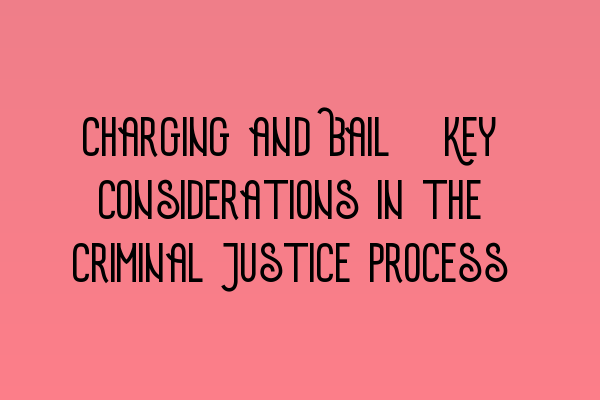Charging and Bail: Key Considerations in the Criminal Justice Process
Welcome to our blog at SQE Criminal Law & Practice Law UK! In this post, we will be discussing the critical aspects of charging and bail in the criminal justice process. Whether you are a law student, legal professional, or simply interested in understanding the intricacies of criminal law, this article is for you.
The Process of Charging
When a crime is committed, one of the first steps in the criminal justice process is charging the suspect. The charging decision is made by the Crown Prosecution Service (CPS) in England and Wales, or the Procurator Fiscal in Scotland. It involves carefully considering the evidence gathered by the police and determining whether there is enough evidence to bring a case to court.
The CPS follows specific guidelines and criteria when deciding whether to charge an individual. These include the sufficiency and credibility of evidence, public interest considerations, and the likelihood of securing a conviction. It is important to note that the decision to charge is not based on determining guilt or innocence, but rather on the strength of the case.
Once a decision to charge has been made, the suspect is formally informed of the charges against them. This is a crucial stage where the suspect’s rights must be respected, including the right to legal representation. At SQE Criminal Law & Practice Law UK, we specialize in providing expert legal advice and representation during the charging process.
The Role of Bail
After an individual is charged, the next consideration is whether to grant them bail or remand them in custody. Bail is the temporary release of a suspect from custody while awaiting trial. It is an important aspect of the criminal justice process as it upholds the principle of “innocent until proven guilty.”
The decision to grant bail is made by the police, a court, or a magistrates’ court. When considering whether to grant bail, several factors are taken into account, such as:
- The nature and seriousness of the offense
- The defendant’s previous criminal record
- The likelihood of the defendant fleeing the country
- The potential risk to public safety or witnesses
- The defendant’s ties to the community, including family and employment
In cases where bail is not granted, the defendant may be remanded in custody until their trial. At SQE Criminal Law & Practice Law UK, our experienced solicitors understand the complexities of bail applications and can provide expert advice and representation to secure the best outcome for our clients.
The Importance of Legal Representation
The charging and bail process can be overwhelming and complex, requiring the guidance of a knowledgeable legal professional. At SQE Criminal Law & Practice Law UK, our team of solicitors specializes in criminal law and can provide the expert representation you need during this critical stage of the criminal justice process.
Our extensive experience allows us to navigate the complexities of charging decisions and bail applications effectively. We understand the importance of upholding your rights and ensuring a fair process. Whether you require advice on the evidence and charges against you or need support in securing bail, we are here to help.
For more information on related topics, please feel free to check out our Demystifying the Solicitors Qualifying Examination Format or our guide on LLC Formation Made Simple: Step-by-Step Guide for UK Entrepreneurs.
If you would like a comprehensive overview of business regulations in the UK, we recommend reading our article on Business Regulations in the UK: A Comprehensive Overview. Ethical considerations are also an integral part of UK law, and our post on Ethical Considerations in UK Law: Upholding Professional Standards explores this topic in detail.
